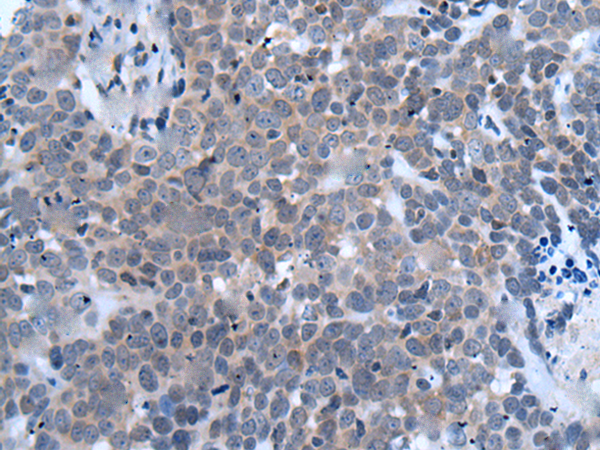
| WB | 咨询技术 | Human,Mouse,Rat |
| IF | 咨询技术 | Human,Mouse,Rat |
| IHC | 1/10-1/50 | Human,Mouse,Rat |
| ICC | 技术咨询 | Human,Mouse,Rat |
| FCM | 咨询技术 | Human,Mouse,Rat |
| Elisa | 1/5000-1/10000 | Human,Mouse,Rat |
| Aliases | HHL; HRY; HES-1; bHLHb39 |
| Host/Isotype | Rabbit IgG |
| Antibody Type | Primary antibody |
| Storage | Store at 4°C short term. Aliquot and store at -20°C long term. Avoid freeze/thaw cycles. |
| Species Reactivity | Human, Mouse, Rat |
| Immunogen | Synthetic peptide of human HES1 |
| Formulation | Purified antibody in PBS with 0.05% sodium azide and 50% glycerol. |
+ +
以下是关于HES1抗体的3篇文献及其摘要概括:
1. **文献名称**:*Hes1 is a target of microRNA-23 during neural stem cell commitment*
**作者**:Kageyama, R. 等
**摘要**:研究利用HES1抗体揭示miRNA-23通过抑制HES1表达调控神经干细胞分化,证明HES1抗体在检测蛋白表达动态中的关键作用。
2. **文献名称**:*Dynamic expression of Hes1 in the developing nervous system and its role in neural stem cell maintenance*
**作者**:Hirata, H. 等
**摘要**:通过免疫组化(HES1抗体)发现HES1在神经前体细胞中周期性表达,维持其未分化状态,并抑制神经元分化基因。
3. **文献名称**:*Hes1 regulates embryonic stem cell differentiation by suppressing Notch signaling*
**作者**:Kobayashi, T. 等
**摘要**:使用HES1抗体进行染色质免疫沉淀(ChIP),证实HES1通过抑制Notch通路靶基因调控胚胎干细胞向中胚层分化的机制。
(注:以上为示例性内容,实际文献需通过学术数据库检索确认。)
The HES1 antibody is a crucial tool in studying the HES1 (Hairy and Enhancer of Split 1) protein, a basic helix-loop-helix (bHLH) transcriptional repressor involved in developmental processes and cellular differentiation. HES1 is a key effector of the Notch signaling pathway, regulating cell fate decisions, stem cell maintenance, and tissue homeostasis by inhibiting the expression of target genes like proneural factors. It plays vital roles in neurogenesis, somitogenesis, and organogenesis, with dysregulation linked to cancers, neurological disorders, and developmental defects.
Researchers use HES1 antibodies to detect and quantify HES1 protein levels in techniques such as Western blotting, immunohistochemistry (IHC), immunofluorescence (IF), and flow cytometry. These antibodies aid in exploring HES1's temporal and spatial expression patterns during embryogenesis, tissue repair, and disease progression. In cancer biology, HES1 antibodies help investigate its oncogenic role in tumors like glioblastoma, T-cell leukemia, and colorectal cancer, where HES1 overexpression often correlates with poor prognosis.
Commercially available HES1 antibodies are typically raised against specific epitopes of human HES1. with cross-reactivity tested in model organisms like mice and rats. Validation includes knockout controls to ensure specificity. Challenges include HES1's short half-life and pulsatile expression, requiring optimized experimental conditions. Proper antibody selection (monoclonal vs. polyclonal) and validation are critical for accurate interpretation of its dynamic regulatory roles in health and disease.
×